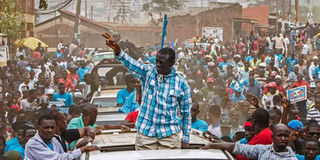How Besigye suit was blocked

Dr Kizza Besigye during an election rally in Kampala on February 10, 2016. A series of state-sponsored arrests before and after the February 18 presidential election have ensured that Uganda’s opposition leader Kizza Besigye does not file a petition challenging President Museveni’s election at the country’s Supreme Court. PHOTO | AFP
What you need to know:
- The ten-day window within which any aggrieved person can challenge a presidential election lapsed on Tuesday without the Forum for Democratic Change (FDC) presidential flagbearer lodging his petition.
- Another presidential candidate, Mr Amama Mbabazi however managed to file a petition challenging the results late on Tuesday, setting the stage for what promises to be a major legal battle at the country’s Supreme Court.
- Signs that authorities were determined to curtail Dr Besigye’s movements were evident in the final days of the presidential campaigns when armed police barred him from addressing his final rally in Kampala on grounds that it would occasion civil unrest.
- A day after the election, Police stormed FDC’s headquarters and arrested Dr Besigye who was holding a meeting with his campaign team and top party officials led by its chairman Major Gen. Mugisha Muntu amid fears that the opposition leader planned to release his own tally of the Presidential election results.
A series of state-sponsored arrests before and after the February 18 presidential election have ensured that Uganda’s opposition leader Kizza Besigye does not file a petition challenging President Museveni’s election at the country’s Supreme Court.
The ten-day window within which any aggrieved person can challenge a presidential election lapsed on Tuesday without the Forum for Democratic Change (FDC) presidential flagbearer lodging his petition.
Another presidential candidate, Mr Amama Mbabazi however managed to file a petition challenging the results late on Tuesday, setting the stage for what promises to be a major legal battle at the country’s Supreme Court.
Signs that authorities were determined to curtail Dr Besigye’s movements were evident in the final days of the presidential campaigns when armed police barred him from addressing his final rally in Kampala on grounds that it would occasion civil unrest.
ARRESTS
During the ensuing confrontation, Dr Besigye was briefly arrested and later driven to his home at Kasangati, about twenty kilometers from the capital city with the Inspector General of Police Kale Kayihura warning that his men would not allow the opposition leader and his supporters to disrupt peace in Kampala.
This set off a series of police actions that saw Dr Besigye literally jailed in his own home, unable to assemble any meaningful evidence to challenge the Electoral Commission’s decision to declare Mr Museveni the President-elect.
Dr Besigye was to be arrested again on the voting day, moments after he arrived in Kampala after casting his vote at Rwakabengo – Rukungiri municipality in Western Uganda.
He was later driven home in a calculated action to ensure he did not have contact with his campaign team amid fears that he planned to whip up public unrest.
TALLY RESULTS
A day after the election, Police stormed FDC’s headquarters and arrested Dr Besigye who was holding a meeting with his campaign team and top party officials led by its chairman Major Gen. Mugisha Muntu amid fears that the opposition leader planned to release his own tally of the Presidential election results.
Police surrounded the party’s headquarters and fired tear gas and water cannons, before bursting in and arresting Dr Besigye and his team.
“Some reasonable measures have been applied to rein in FDC supporters who wanted to disturb the peace and the ongoing exercise,” senior police officer Felix Andrew Kaweesi told journalists.
“Besigye knows very well that the mandate to declare electoral results lies with the electoral commission,” he added.
During the crackdown, security forces also rounded up and detained over 200 FDC figures across the country.
Some of those detained, it was reported, had crucial polling materials in their possession that could be used as evidence in Dr Besigye’s petition while others were party supporters picked up from regional offices.





